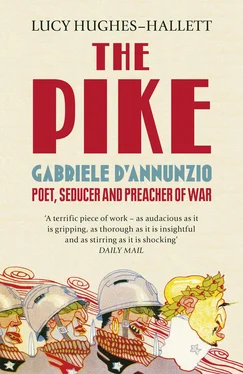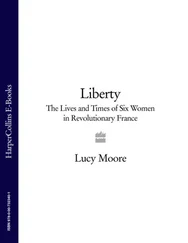Children obliged to fend for themselves in a loveless environment grow a shell around their hearts which can be hard to crack open later. D’Annunzio matured into an adult notably lacking in empathy, an exploitative friend, an unreliable lover and a negligent father, for whom people en masse seemed no more interesting than herds of cattle. Some at least of his emotional frigidity can probably be ascribed to his early banishment to school. At the time, though, he responded to his spartan treatment, not only dutifully, but with fervid enthusiasm and declarations of love. The mission that had been laid upon him, that of making a prodigy of himself, was one he accepted enthusiastically. In his first year he wrote to tell his ‘dearest Daddy’ he was top of his class. ‘Oh how sweetly these words flash from my lips, what joy I’m feeling now I have made your wish come true.’
Already, as a schoolboy, he was a passionate little patriot. He wrote, aged thirteen, that he had two missions: ‘To teach the people to love their country … and to hate the enemies of Italy to the death!’ The shrillness was not peculiar to him. Italy was an unstable new amalgam of regions with widely differing histories. Its peoples, whose dialects differed so markedly as to make them in many cases unintelligible to each other, were going to need to be taught to love it. Italian nationalism was both anxious and bellicose. The late nineteenth century was, for all Europeans, a nationalist age, but for newly forged, insecurely unified nations – Germany and Italy prominent among them – it was one where a simple loyalty to the state was linked to a complex web of quasi-religious, quasi-erotic impulses, among them the yearning for heroes to worship. For d’Annunzio those vaguely defined but extreme emotions coalesced around the idea of his own ‘high destiny’.
Francesco Paolo and Gabriele alike believed in that destiny. Aged fifteen, the son wrote to the father: ‘I love praise, because I know that you will enjoy praise offered to me; I love glory because I know that you exult to hear glory attached to my name.’
Glory, glory, glory: the word tolls through his adolescent correspondence. ‘He is entirely dedicated,’ reads one of his school reports, ‘to making a great name for himself.’ An early photograph shows a curly-haired teenager, his expression solemn, his eyes fixed. It is inscribed, in his own hand, with ‘To Glory’. His path there would be literary, but he prepared himself for it with the kind of self-punishing dedication that a religious novice might devote to asceticism, or a would-be soldier to physical training.
The standard curriculum was not enough. He learned to play the violin and the flute. He took singing lessons. He set himself holiday tasks – the translation of Ovid’s Metamorphoses, the compilation of a book of ‘observations’. When the signal was given for the end of evening study, and the rest of the boys prepared for bed, he went around collecting the others’ left-over lamp oil so that he could work far into the night. He wrote to tell his father he was top of the class again, adding, ‘If you knew what it had cost me to reach that position!’ He saw himself as a hero who bore the marks of his exploits written on his body. His left shoulder, he wrote later, was lower than the other, so many hours had he spent, as a growing boy, hunched over his desk.
When he was permitted to bypass an exam, he wrote to tell his mother how disappointed he was, ‘I am certain I would have taken first place.’ When he was sixteen he wrote six letters to his parents for Easter, one in Italian, the others in Greek, Latin, English, French and Spanish. The great book he felt certain he would write one day, was, he wrote, a ‘peak’ he would climb.
The College of the Cicognini was run on military lines. The boys wore smart little uniforms, turquoise trousers and tunics with frogging and epaulettes. They were students, but they were also toy soldiers. They were drawn up into two ‘companies’, each consisting of four ‘squads’, and well-behaved boys were honoured with officer status. In his second year d’Annunzio was made a ‘corporal’. Three years later he was promoted to the rank of ‘sergeant’ and in his last winter at the school he became ‘commandant’ (the title he would give himself at Fiume). The boys’ days were punctuated by drum rolls announcing the beginning and end of lessons and study periods; their exercise was drill, their excursions were route marches, their games were battles, their heroes were conquerors.
The study of the classics took up a high proportion of the students’ time. So it did at schools all over the Western world, but for an Italian child Latin literature and Roman history had a potent local significance. British schoolboys might be encouraged to cultivate the stoic virtues the Roman Republic had borrowed from Sparta, and to trace the similarities between Roman stoicism and late-Victorian stiff-upper-lippery. They might identify the British Empire with the Roman one, and, reading Macaulay’s Lays, compare the dogged courage of his Roman heroes with that of Britain’s own colonial officers. For Italian children no such imaginative effort was required. In Plutarch’s Lives, they found the stories of Italy’s own native heroes. Reading Ovid and Horace they were studying the poets whose genius constituted part of their own nation’s claim to greatness. Virgil’s Aeneid described the founding of the state which – after a hiatus lasting a dozen centuries – had newly re-emerged. Livy and Caesar told how that state had fought and conquered. Tacitus (this was especially pleasing) described how the Italians/Romans had defeated the Germanic peoples to the north, the forebears of the Austrians who had, in the boys’ parents’ and teachers’ lifetimes, ruled most of northern Italy. Towards the end of d’Annunzio’s life, Mussolini was to make a public cult of Romanità. To a child educated as d’Annunzio was, that cult was no artificially imposed construct, but a cluster of associations which had shaped his sense of history and his notions of virtue from the very beginnings of his intellectual life.
Glory was not confined to antiquity. For nineteenth-century Europeans the great conqueror was Napoleon. In a world where, as Thomas Carlyle lamented in 1848, great men were scarce, the memory of Napoleon’s rise from modest beginnings to become a Europe-bestriding superman was inspirational. Even those for whom he had been unequivocally the enemy (Englishmen like Byron, Russians like Tolstoy) were fascinated by him. For Italians it was even possible, with a little patriotic sophistry, to claim him as one of their own. One could dwell, not on the French Bonaparte’s invasion of Italy at the head of a French army, but on the Corsican Buonaparte’s success (however temporary) in driving out the hated Austrians. Napoleon had called upon Italians to rise up together, to unite. He had given them their tricolour flag. True, he had pillaged their art galleries and made their principalities perks for his relatives, but Italy could console itself by claiming a part in his glory.
Francesco Paolo d’Annunzio made use of his numinous memory in his efforts to make a hero of his son. Visiting Gabriele in Prato, he brought him a coin, bearing the image of Napoleon as King of Italy, and the Mémorial de St Hélène by the Comte de Las Cases. The count was one of Napoleon’s aides and was with the fallen emperor on his prison-island. His eight-volume memoir was a tremendous bestseller, and the essential source book for the cult of Bonapartism. Reading it, d’Annunzio became obsessed. He established the first of his many collections, a hotch-potch of rags and horse-shoe nails; he called it his ‘reliquary’. He became a worshipper, not of God, but of ‘Our Lord, who was called Napoleon Bonaparte.’
Читать дальше












